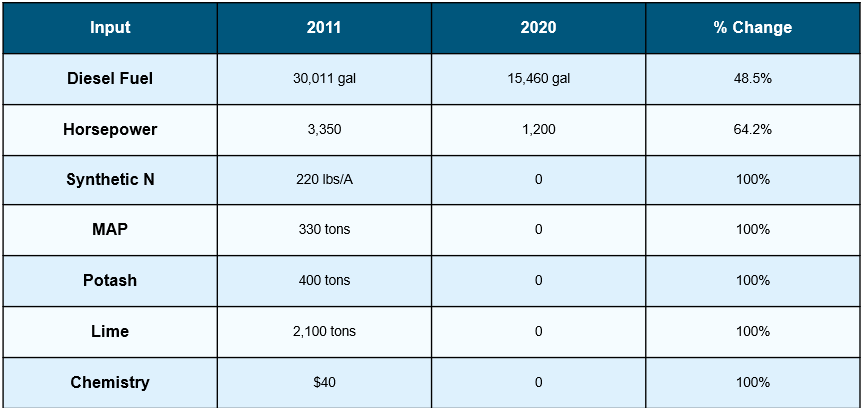Grower Spotlight: Learn why a farmer focuses on soil health over yield and saves an average $828k per year
by Indigo Agriculture
Rick Clark, a 5th generation farmer, speaks about his experience improving his farm's soil health. For 11 years, he has been no-till, using cover crops, implementing crop diversification and significantly reducing inputs. During this time, solely looking at inputs, he saves an average of $828k per year.
Indigo held a Soil Health Seminar in Indiana, and we had the honor to have Rick Clark, a 5th generation farmer, speak about his experience improving his farm’s soil health. Clark has been implementing practices to improve soil health for the last 11 years. He started with no-till, then moved to add cover crops, crop diversification, and then removing all inputs in order to have a symbiotic relationship with mother nature.
Clark and his team members see immense positive effects year-over-year on soil health which leads to better profitability as well as improving human health.
Clark understands not all farms can go all in like his, but encourages farmers to adopt practices that improve soil health as well as to keep money in their pockets. On Clark’s operations, he had an average savings of $828k per year in inputs alone. This number is conservative and does not take into account labor, and machinery costs if he stayed conventional. See a breakdown of his changes below.

By working with mother nature, growers can be more efficient with resources and inputs. If using synthetic fertilizers, crops typically only use 35% of what is applied in a conventional system, while the other 65% leaches away. Clark feels conventional farming is inefficient in the practices and destroys any improvements made during the growing season, especially with tillage which removes the nutrients built in the topsoil.
Clark recommends that to build confidence in any changes, it is important to keep records of how it’s gone in the past and how the changes performed. You’re then able to analyze what works and what doesn’t to lead to better and more confident decisions. In addition, keeping good records, and tracking progress is key to ensuring proper soil health too. Below is an example of the visualization Clark was able to create by keeping records which built his confidence in the changes he made were in the right direction.
Clark is a big proponent of farming green which is maximizing what the cover crop is meant to do. This is why he removed all inputs, constantly feeding the microbes and throwing the pests curveballs.
Benefits of Farming Green
- Sequestration of nutrients which cereal grain is king
- Nitrogen-fixing with legume packages
- Erosion control of water and wind
- Increased pounds of biomass to suppress weeds
- Feeds microbes
- Armors the soil
- Limits evaporation
- Grows carbon for the new rising market to receive extra income
Clark as a farmer drives his decision on being a good steward to the land, which goes beyond soil health and encompasses human health, community, ROI and impact you make on this world.
This article may include information from third-party sources or other information that Indigo may not independently verify. Carbon quantification methods, processes and understandings are in their nascency and subject to change and continuous development. The information contained herein is for general informational purposes only and may be based on generally applicable assumptions that may not be applicable to any individual operation. Actual results may differ among growers and farms based on a large number of variables. Each operation should independently consider the financial implications and all potential risks and benefits of the use of any agronomic practice. Any payments under Carbon by Indigo are subject to multi-year vesting and are contingent on continued long-term maintenance of regenerative agricultural practices and soil carbon levels. All Carbon Credits generated are subject to buffer pool holdbacks required by third-party crediting; participants will not receive payments for such holdback. Neither Indigo nor its representatives or affiliates makes any representations, warranties or guarantees as to any specific outcomes (agronomic, financial or otherwise) in connection with any recommendations, calculations or predictions. Terms, conditions, limitations and eligibility requirements apply. See program agreement for additional details regarding Carbon by Indigo.
Farmers like you are getting paid to implement practices that improve soil health. With skyrocketing input costs, see how covers help.
You might also be interested in:
Neither Indigo nor any of its affiliates makes any representations, warranties or guarantees as to any specific results or outcomes, including, without limitation, with respect to soil health outcomes or any minimum amount of greenhouse gasses sequestered or number of carbon credits generated. Participation in Carbon by Indigo is subject to the terms, conditions and limitations of the program contained in the applicable enrollment agreement. Any payments under Carbon by Indigo are subject to multi-year vesting and are contingent on continued long-term maintenance of regenerative agricultural practices and soil carbon levels. All Carbon Credits generated are subject to buffer pool holdbacks required by third-party crediting; participants will not receive payments for such holdback. Not available in all areas.
500 Rutherford Ave, Boston, MA 02129 | 844.828.0240 | info@indigoag.com